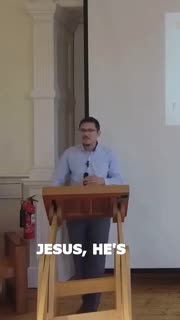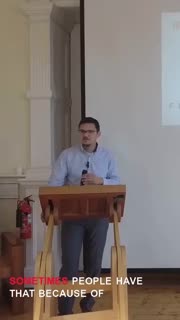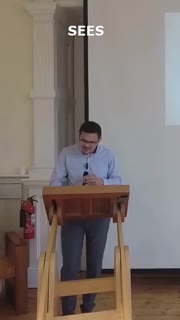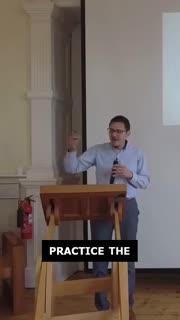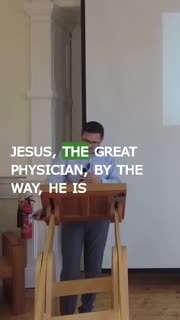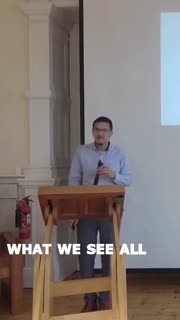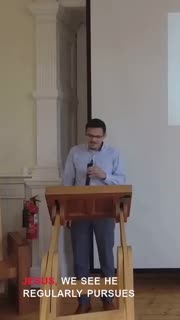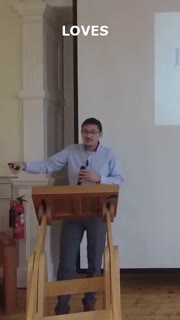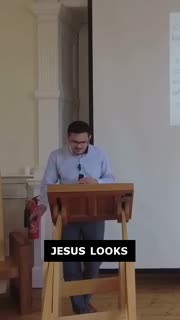Jesus: The Heart of Compassion for Sinners
Devotional
Sermon Summary
Bible Study Guide
Sermon Clips
### Quotes for Outreach
1. "You know, Jesus, he's been, primarily what he's been doing is he's been teaching and preaching. He's been going to wee villages and small towns all around the Sea of Galilee and he's bringing the message. He's bringing a message of hope. He's bringing a message of how someone can have a relationship with God. We call it the gospel, the good news of how people can be rescued from their sin and personally know God." [01:22] (24 seconds)
2. "Sometimes people have that because of maybe a past religious experience, religious teachings that perhaps are very performance based. They were rules based. Uh, they were workspace. They were fear based, meaning that, man, I need to just be good enough. And if I'm good enough and I try hard enough, maybe I can know about God. Maybe I have a relationship with God." [04:14] (21 seconds)
3. "Jesus sees our sin, but yet, in spite of it, he wants to save us. He wants to rescue us. Jesus sees my sin, but he looks past that like most of us won't do and he sees the potential." [11:59] (13 seconds)
4. "Jesus communicated the gospel to people with his words in me. He taught, he preached, he spent a lot of time doing that, but that's not all he did. He ate with people. If he could practically meet a need in someone's life, he wanted to bless people. And that's the kind of believers we should be." [20:42] (60 seconds)
5. "Jesus, the great physician, by the way, he is free. He perfectly diagnoses. He's not ambiguous. He's not vague. He perfectly cures. He's always available. There's no queue." [33:15] (16 seconds)
### Quotes for Members
1. "And so if you look with me again at Mark chapter 2 in verse is 13 through 17. In verse 13, it tells us, and he went forth again by the seaside and all the multitudes resorted unto him and he taught them." [01:22] (16 seconds)
2. "And what we see all throughout scriptures is that Jesus, God, he is a friend of sinners. He is a friend of sinners. In verse 14, we see Jesus, he looks, over, he sees Levi. His eyes meet Levi's eyes, Matthew's eyes, sitting in a tax booth." [09:25] (19 seconds)
3. "Jesus, we see he regularly pursues hopeless outcasts, doesn't he? He never writes anybody off. You think about Mary, Mary Madeline, the lady, she just was out of her mind, wasn't she? She was possessed with different demons and Jesus reaches out to her." [10:46] (15 seconds)
4. "Jesus loves us. He loves us where we're at, but he also loves us way too much to just leave us where we're at. Churches often say something. We would say this here at DBF. We really believe this. We often say, come as you are. Everyone is welcome. Come as you are." [17:40] (17 seconds)
5. "Jesus looks at the adulterer. He said, such were some of you. Jesus looks at the addict. He says, such were some of you. He looks at the abuser. He looks at the liar. He looks at the, um, the adulterer. And he says, such were some of you. He looked at, looks at the materialistic person. Such were some of you." [37:42] (24 seconds)
Ask a question about this sermon
1. "You know, Jesus, he's been, primarily what he's been doing is he's been teaching and preaching. He's been going to wee villages and small towns all around the Sea of Galilee and he's bringing the message. He's bringing a message of hope. He's bringing a message of how someone can have a relationship with God. We call it the gospel, the good news of how people can be rescued from their sin and personally know God." [01:22] (24 seconds)
2. "Sometimes people have that because of maybe a past religious experience, religious teachings that perhaps are very performance based. They were rules based. Uh, they were workspace. They were fear based, meaning that, man, I need to just be good enough. And if I'm good enough and I try hard enough, maybe I can know about God. Maybe I have a relationship with God." [04:14] (21 seconds)
3. "Jesus sees our sin, but yet, in spite of it, he wants to save us. He wants to rescue us. Jesus sees my sin, but he looks past that like most of us won't do and he sees the potential." [11:59] (13 seconds)
4. "Jesus communicated the gospel to people with his words in me. He taught, he preached, he spent a lot of time doing that, but that's not all he did. He ate with people. If he could practically meet a need in someone's life, he wanted to bless people. And that's the kind of believers we should be." [20:42] (60 seconds)
5. "Jesus, the great physician, by the way, he is free. He perfectly diagnoses. He's not ambiguous. He's not vague. He perfectly cures. He's always available. There's no queue." [33:15] (16 seconds)
### Quotes for Members
1. "And so if you look with me again at Mark chapter 2 in verse is 13 through 17. In verse 13, it tells us, and he went forth again by the seaside and all the multitudes resorted unto him and he taught them." [01:22] (16 seconds)
2. "And what we see all throughout scriptures is that Jesus, God, he is a friend of sinners. He is a friend of sinners. In verse 14, we see Jesus, he looks, over, he sees Levi. His eyes meet Levi's eyes, Matthew's eyes, sitting in a tax booth." [09:25] (19 seconds)
3. "Jesus, we see he regularly pursues hopeless outcasts, doesn't he? He never writes anybody off. You think about Mary, Mary Madeline, the lady, she just was out of her mind, wasn't she? She was possessed with different demons and Jesus reaches out to her." [10:46] (15 seconds)
4. "Jesus loves us. He loves us where we're at, but he also loves us way too much to just leave us where we're at. Churches often say something. We would say this here at DBF. We really believe this. We often say, come as you are. Everyone is welcome. Come as you are." [17:40] (17 seconds)
5. "Jesus looks at the adulterer. He said, such were some of you. Jesus looks at the addict. He says, such were some of you. He looks at the abuser. He looks at the liar. He looks at the, um, the adulterer. And he says, such were some of you. He looked at, looks at the materialistic person. Such were some of you." [37:42] (24 seconds)
